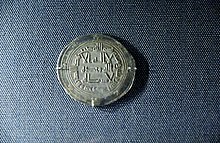Abu Muslim
Some make him a descendant of Gōdarz and of the vizier Bozorgmehr and call him Ebrāhīm; some name him Behzādān, son of Vendād Hormoz; and others relate him to the Abbasids or to the Alids.Al-Kirmani led an uprising against Ibn Sayyar, and drove him from the provincial capital, Merv, in late 746, with the governor fleeing to the Qaysi stronghold of Nishapur.[9][10][11] He took Merv in December 747 (or January 748), defeating the Umayyad governor Nasr ibn Sayyar, as well as Shayban al-Khariji, a Kharijite aspirant to the caliphate.He became the de facto governor of Khurasan, and gained fame as a general in the late 740s in defeating the rebellion of Bihafarid, the leader of a syncretic Persian sect that was Mazdaist.[4] His heroic role in the revolution and military skill, along with his conciliatory politics toward Shia, Sunnis, Zoroastrians, Jews, and Christians, made him extremely popular among the people.Although it appears that Abu al-'Abbas al-Saffah trusted him in general, he was wary of his power, limiting his entourage to 500 men upon his arrival to Iraq on his way to Hajj in 754.Relations deteriorated quickly when al-Mansur sent his chamberlain Abu-al Khasib to inventory the spoils of war, and then appointed Abu Muslim governor of Syria and Egypt, outside his powerbase.I shall not tum back until I have destroyed the Kaba, for this has been [wrongly] substituted for the sun; we shall make the sun our qibla as it was in olden time"[17]Despite his assistance in crushing Behafarid's heresy and the possibility of his own Zoroastrian sympathies, Abu Muslim has not been remembered favourably by the Zoroastrian Orthodoxy in the Middle Persian tradition, as both the Zand-i Wahman yasn and Zaratosht-nama censure Abu Muslim.[13] He became a legendary figure for many in Persia, and several Persian heretics started revolts claiming he had not died and would return;[13] the latter included his own propagandist Ishaq al-Turk, the Zoroastrian cleric Sunpadh in Nishapur, the Abu Muslimiyya subsect of the Kaysanites Shia, and al-Muqanna in Khurasan.

F.C. AboomoslemAbu Muslim FCIsfahanAl-Mada'inAbbasid RevolutionAbbasidKhurasanBattle of TalasBattle of the ZabArabicPersianUmayyad dynastyAbbasid CaliphateKhorasanAbbasid caliphal-MansurBozorgmehrVendād HormozsaddlerBanu IjlShia MuslimsmawālīMuhammadmahdīSunnahghālīal-MughiraMuhammad ibn Ali ibn AbdallahArab settler communityconstant warfareRevolt of Zayd ibn AliQahtaba ibn Shabib al-Ta'iIbrahim ibn MuhammadThird Fitnafeud between the Yaman and Qays tribal groupsNasr ibn SayyarJuday al-KirmaniNishapurKharijitede factoBihafaridMazdaistAkhlaq-i NasiriNasir al-Din TusiLahoreBukharaMuslim conquest of Central AsiaSunnisZoroastriansChristiansal-SaffahAbu-al KhasibzindiqTigrisGorgankushtiSiyasatnamehBehafaridZand-i Wahman yasnZaratosht-namaPersiaIshaq al-TurkSunpadhKaysanites Shiaal-MuqannaBabak KhorramdinMadelung, WilferdDaftary, FarhadWayback MachineBabayan, KathrynEtnograficheskoe ObozrenieHawting, Gerald R.Moscati, S.Gibb, H. A. R.Kramers, J. H.Lévi-Provençal, E.Schacht, J.Lewis, B.Pellat, Ch.Kennedy, HughYarshater, EhsanEncyclopædia IranicaDaniel, Elton L.Hillenbrand, CaroleAbu Hatam IsfizariAbu Ma'shar al-BalkhiAbu WafaAbu Ubayd JuzjaniAbu Zayd BalkhiAlfraganusAli QushjiAvicennaBirjandiBiruniHasib MarwaziIbn HayyanAbu Ja'far al-KhazinKhaziniKhojandiKhwarizmiNasawiNasir al-Din al-TusiOmar KhayyamSharaf al-Din al-TusiAlgazelFarabiHaji Bektash VeliNasir KhusrawSijistaniShahrastaniAbu Dawud al-SijistaniAbu Barakat NasafiAbu HanifaAbu Hafs NasafiAbu Layth SamarqandiAbu Mu'in NasafiAbu Qasim SamarqandiAnsariBaghaviBayhaqiBazdawiBukhariDabusiFatima SamarqandiGhazaliGhaznawi